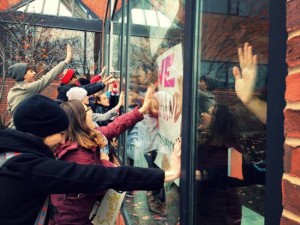COLLEGE FEMINISMS: And We Sat: Violence against the Bodies of Diversity and Transparency (DAT) Student Movement at Syracuse University
By Farrell Greenwald Brenner
The ultimate connection cannot be the enemy. The ultimate connection must be the need that we find between us. It is not only who you are, in other words, but what we can do for each other that will determine the connection.
As we rolled out our sleeping bags onto the cold, brick floor under the gaze of public safety officers, I did not truly comprehend that my body had become both a weapon and a battlefield.
Since the start of the Fall 2014 semester, students had repeatedly gathered on the steps of Hendricks Chapel to cry out in pain and anguish—since September, we had rallied, and rallied, and rallied, and rallied, until our throats were sore and our hands were smeared with ink.
When the Advocacy Center, a facility and community for survivors of sexual assault, was closed without our consent (how apropos!), we rallied. When the Board of Trustees chose to not divest the university endowment from fossil fuels in spite of widespread support from other governing bodies, we rallied. When the contract with the Posse Foundation, a scholarship primarily benefitting students of color and low-income students, was prematurely and unilaterally broken, we rallied.
And when we realized that these were part and parcel of the same system that provided only one psychiatrist for 25,000 students, that allowed for us to go for ten years without a full-time Americans with Disabilities Act coordinator, that did not report salary information to the American Association of University Professors for the first time in fifty years, that made our teaching assistants and graduate assistants some of the poorest-paid laborers in the entire city of Syracuse, that removed any mention of “diverse backgrounds” or “public good” from our mission and vision statements, we decided to rally one more time that year.
We are those students who are beat up on the street, assaulted in our beds, tormented in our homes, and left without money for rent. Peers and professors told us our struggles were irrelevant, and then defined and labeled us by them. I used to believe that an institution without a moral conscience would hear me and advocate for me.
So on November 3, 2014, we marched from the Chapel to Crouse-Hinds Hall, the building that hosts admissions, classrooms, and administrative functions. We delivered a document of grievances and demands that numbered forty-three pages to administrative staff, who then attempted to divert us to another building by blocking entrances. There was so much irony in the image of those men standing between us and the doors to the “admissions” building.
So we sat.
At first, we were told that we could only sit between the hours of 7:00 am and 10:00 pm.
We told them no, we will not be convenient for them. Then we were told that we could only have twenty-four bodies sleeping here overnight; fire codes that we were never allowed to see were cited. We told them no, you will not divide us nor make us choose who will labor and who will leave. So every night, forty bodies dreamt on the cold, brown bricks of Crouse-Hinds.
Then they sent an older woman of color—a dean—to mediate between the unreasonable protestors and the upper-level administration. We told them no, we will not be complicit in your sexist, racist labor practices. We waited to speak with the senior executive team.
And we sat.
Then they called us “unruly” and “irrational” because we had been loud, and because we had used student testimonies, not statistics, to demonstrate our grievances. We laughed, because we refused to play games of respectability and be policed into obedience. We laughed because our emotions and our stories were less valuable than data that did not exist because it could challenge the very institution that would collect and publish it.
And we sat.
Then they grabbed our ID cards from our hands and recorded them without our consent. That night, I whispered my name to myself over and over again, lest I forget that it was not theirs to own. When my eyes finally closed, the last thing I saw was the palatine gaze of a public safety officer.
And we sat.
Then they stood around the room as we shared stories of pain and hurt with each other. As we recounted histories of unbelonging and violence and silencing as a result of our classmates’ disrespect, which had been fostered by an institution that did not value us, one of the administrators recorded us on his cell phone. I saw another smile. When professors asked them (politely, in spite of our irrelevant, raging, radical politics) to respect our personal space, they refused to leave. As students continued to voice their discomfort, one white administrator boomed with bellicose authority over students and faculty of color. He marched out—what a luxury, to lose nothing in walking away!
And we sat.
Then they turned off the heat. So we huddled together, and the friction of an organic tenderness—sometimes called love—against an unfeeling, dark wall kept us warm.
And we sat.
Then they told us we could not use the classrooms for meetings. We told them no, you will not prevent us from educating ourselves. We held teach-ins every day, no tuition charged. Our attendance rate was stellar—hundreds of people came to learn for the sake of learning. Professors joined us, and they marched to Chancellor Syverud’s house to deliver a formal invitation to continue dialogues.
And we sat.
As the first weekend approached, they told us we would not be allowed re-entry between 5:00 pm Friday and 7:00 am Sunday. So we stayed, and sat. They told us that food would only be allowed into the building during two forty-five minute windows each day. So we went without. Still, there were teaching assistants who were eating better on donated food than they normally did on their substandard wages.
And we sat.
Then, we woke up to cameras trained on our tired, aching bodies. So we stuck out our tongues and said “cheese!”
And we sat.
Then they put up a tall, green fence around the building to hide us from view. So we turned that fence into a wall of remembrance for other students that had been lost to mental illness, who didn’t have the support they needed to survive. Those signs were torn down, but we were not.
And we sat.
Then they threw us envelopes with Codes of Conduct, cryptically highlighted with no explanations. Then they told us legal counsel would not be allowed into the building over the weekend. Our professors told them no, we will not let you criminalize our students. We will not let you “instill fear and compliance in our students.”
And we sat.
Then they told us that they had to balance our needs and those “of the 21,000 other students who attend our University” as if those other students would not also benefit from fairer wages, from more mental health services, from a more accessible campus. As if, in the event that our demands could not directly benefit the white, able-bodied, straight, upper-middle class students of the student body, that they would be any less meaningful.
And we sat.
When I stepped into Crouse-Hinds Hall, it became acceptable for my face and body to be photographed without consent; it became acceptable for me to be trivialized and objectified. Few folks outside of the movement realized that challenging and denigrating my activism was an attack upon my body as well. My politics aren’t spun from nothingness—they are a defense against the pain I have endured and a vow to never commit the same harm to Others. If you have no problem abusing my belief in structures of justice, I wondered to myself, how long before my physical presence, which relies on such justice, is also abused? I did not feel safe. I could not—cannot—separate my very public fight for a more supportive campus from my lived experiences of violence. Those who try to are erasing those experiences—another act of violence.
After days and days of this torment I reached my breaking point. At her keynote talk at the 2014 National Women’s Studies Association conference, bell hooks said, “If you stand up against certain forms of power, while that power has control over your life, it will use that power against you.” I was living in perpetual fear for my health, sanity, education, and willfulness. I had never wanted to run away from anything so bad. I contemplated transferring. I contemplated dying. Neither of these things happened, nor will happen—while I sit in discomfort as a continual participant in the academic industry, I could not empower it with my silence.
And because the collective was comprised of humans—individual, fallible humans—I can’t pretend this was some sort of immortal activist utopia. Sometimes these would be the first people I would turn to in the bouts of anxiety. But I also faced abuse at the hands of individuals who were sitting next to me. Just because we came together under a banner of solidarity does not mean we were solidly devoid of our own injustices. As we occupied one structure, we sometimes neglected the structures occupying us. One of my advisors remarked to me that certain mechanisms serve different purposes at different times—for now, I rest easier knowing that the recession of a particular group does not denote the extinction of its ideas.
Our bodies are any combination of Black, queer, disabled, ill, poor, assaulted, and undocumented. They aren’t the kinds of bodies accepted at respectable, alabaster dinner tables. If we had waited for an invitation, we would have been waiting ourselves into our graves. After eighteen days of protest, immeasurable community support, and administrative disregard, we left on our own terms. There is more work to be done, but it all starts from the ground on which we sit.
**************************
 Farrell Greenwald Brenner is a sophomore Women’s & Gender Studies and Citizenship & Civic Engagement double major at Syracuse University. When without a megaphone, Farrell can be found editing for The OutCrowd Magazine or facilitating discussions on gendered violence in academic contexts.
Farrell Greenwald Brenner is a sophomore Women’s & Gender Studies and Citizenship & Civic Engagement double major at Syracuse University. When without a megaphone, Farrell can be found editing for The OutCrowd Magazine or facilitating discussions on gendered violence in academic contexts.





Pingback: COLLEGE FEMINISMS: REMINDER Call for Forum Submissions on Campus Violence, Resistance, and Strategies for Survival - The Feminist Wire | The Feminist Wire